How to grow big roses
I was out today cutting back pittosporum and rosemary and hoisting up roses that had been squashed by this winter's snow and thinking about how dang BIG the roses had gotten and the methods I had employed to get them that way. We all want large, flourishing rosebushes, don't we? I've never seen anyone describe my own methods of cultivation on the forum, and I thought I'd let you all in on my secrets. So here goes...
First, when choosing the varieties you're going to plant, you must choose slightly more roses than you really reasonably have room for. You can choose varieties that get large, but that's not the only possibility open to you. Another option to pick out small roses, as long as they're Teas or Chinas and the size estimates in the catalog are taken from British references. That works, for example in the case of 'Mutabilis'. Failing that, try to get roses that the nursery staff has switched labels on, so that you plant the leggy sky-reaching climbing Hybrid Tea where the shrub was supposed to go. And be sure to get at least one rose that's described as a shrub and about whose climbing (and suckering, even when grafted) capacities the catalog doesn't say a word, such as 'Complicata'.
Okay. Now that you've picked out your roses, plant them in a spot that's hard to get at. A steep slope with rickety terracing is good, especially if you've been rather creaky lately and really don't want to fall off a ladder and land with a scream in 'Cl. Etoile de Hollande's thorns. If you have any doubts about the rather large number of roses you ordered, comfort yourself with the thought that the poor, mortar-laced, weed-supporting soil of the escarpment will contain their size. Plant your roses. Water them the first year, and put some hay around their bases when the ground looks bare. Admire them whenever you pass. Don't spray them, don't prune them, don't fertilize them, DON'T FUSS OVER THEM. This is why you put them where they're hard to get at and you risk killing yourself if you try. After a few years, your roses will be monsters. Guaranteed.
Melissa
Comments (40)
Related Professionals
Derry Landscape Architects & Landscape Designers · Deer Park Landscape Architects & Landscape Designers · Fort Lee Landscape Architects & Landscape Designers · Marco Island Landscape Architects & Landscape Designers · Athens Landscape Contractors · Longview Landscape Contractors · Salem Landscape Contractors · South Hackensack Landscape Contractors · University City Landscape Contractors · Vacaville Landscape Contractors · Palos Hills Landscape Contractors · Beaumont Siding & Exteriors · Boston Siding & Exteriors · Boulder Siding & Exteriors · Castle Rock Siding & Exteriorsjacqueline9CA
15 years agolast modified: 9 years agoMelissa - I particulary liked the part about British references! When I first started with roses, I bought a bunch of books on old roses written by British experts. Low and behold, the roses they said were 3 feet high (note - they DID NOT say "in our unfortunately cloudy & cool climate" ) grew to be 10-15 feet high here in warm No CAL, and my opinion of their expertise fell sharply.
A couple of other ideas to grow large roses that have worked for me:
Plant a tall grower in the dark shade below an old tree & stand back, and within 3 years or so it will have grown entirely up the tree, jumped over to neighoring trees, will bloom its head off when it gets to the sunlight at the top of the canopy (I have a Mme Alfred Carriere which has been in full bloom at the top of a tree for 3 weeks already) and will be completely impossible to prune. It does not need feeding, being rooted in the overgrown/neglected part of the garden where it has natural foreset mulch created by all of the "clean-up" we don't do!
Plant several tall climbers - once blooming like banksies, hybrid giganticas, and also climbing polyanthas like Cecil Bruner - alongside of your house next to the driveway, and let them climb up to the roof and happily intermingle. You only need to prune them every 4-5 years or so when they fall off the house and block the driveway in winter storms.
Jackie
bluesibe
15 years agolast modified: 9 years agoBeen there, done that, still doing that. Is there a book, growing roses for dummies, I think your post covers it all.
jon_in_wessex
15 years agolast modified: 9 years agoIf that's the sort of look you want, fine - of course do nothing to them. But why bother to insult the way other people grow them?
sherryocala
15 years agolast modified: 9 years agoOh, goodie, I guess my fertilizing and fussing will keep them smaller. What a relief!
Sherry
melissa_thefarm
Original Author15 years agolast modified: 9 years agoJon,
I certainly didn't mean to insult anyone's cultivation methods! I'm sorry you thought that was what I had in mind. I believe that there's so much unhappiness in the world that I see no reason to add to it by telling people that they're doing this and that wrong in the garden: the garden is supposed to be a place to do what you want and to feel good. Jeri's explanation is 100% correct, and I'll add that Italian catalogs draw much upon British references and are often wildly wrong in their estimates, which of course is why I included that comment. And yes, of course I was laughing at myself and not sneering at gardeners like you.Jackie, I can see you're a gardener after my own heart!
Sherry, of course not! If I lived in Florida (which is my home state, so I know how the soil tends to be), I'd be amending too. The title of a gardening book I saw years ago says it all: "Basic Gardening in Florida Sand".
Melissa
mendocino_rose
15 years agolast modified: 9 years agoOh no! Mellissa's post was all in fun. Michael always says if you want to get rid of something that you should say you are growing it commercially and fuss over it and if you want it to flourish ignore it. But it's just a joke of course.
zeffyrose
15 years agolast modified: 9 years agoMelissa---I read your post with great delight----because I have had the same experience with some of my roses ---to mention one --Paul's Himalayan Musk----the most neglected rose I have and also the most prolific-
Florence
ingrid_vc so. CA zone 9
15 years agolast modified: 9 years agoMelissa your post was wonderful and too funny, and often so true. I think it's called the contrariness of nature. I believe you did mention at one time that your soil is clay and thus retains water very well (unless I'm thinking of someone else altogether). Gardening on decomposed granite on the other hand means you will have many very well-adapted and happy weeds and roses that sneer at you unless you make lovely circles around each one to hold the water and then lavish them with alfalfa and compost and water that we don't have in So. California. It certainly separates the men from the boys, and roses that languish will just have to go to rose heaven, which is why I try to stay with teas and chinas and similar toughies. What I'll never understand is why two identical shrubs planted within a few feet of each other will grow up to be one lush specimen and one miserable suicidal twiglet. I think it's all part of the same concept you describe. Maybe we'll just have to accept that nature has its mysterious ways and we're just not smart enough to understand it all. Well, at least it keeps us humble!
Ingrid
jon_in_wessex
15 years agolast modified: 9 years agoCaught me on a bad day :)
However, I have heard these comments about English writers so often in my ten years reading American rose forums:
'When I first started with roses, I bought a bunch of books on old roses written by British experts. Low and behold, the roses they said were 3 feet high (note - they DID NOT say "in our unfortunately cloudy & cool climate" ) grew to be 10-15 feet high here in warm No CAL, and my opinion of their expertise fell sharply.'
...that I would like to mention a couple of things.
I am sure you are not really suggesting that English/French/German writers should have to explain that they are writing about their own climates, or that they should make a point of saying how their roses may grow if left unpruned in a certain part of California (how would they know?). Why would they then not also have to make statements about how they would grow in New York State, or Outer Mongolia? A small amount of common sense is taken for granted.
Secondly, English writers - and catalogue writers - will not, with some exceptions such as Species roses, describle the dimensions of roses in an unpruned or neglected state, but rather as they would expect to see them grown to best advantage and health in a typical garden. This is because it is expected that they will be pruned - English gardeners invariably do prune their roses - for those seemingly despised 'aesthetic reasons', average size of suburban gardens and because climatic considerations mean that in many areas of the country Winter damage and weak growth have to be countered ('health reasons').
I am sorry if this lowers your opinion of their expertise, but I hope it makes it a bit more understandable?
Those of you who know me will know that I love the diversity of ways of growing our wonderful roses - that I get as much joy from pictures of Pam's and Gregg's gardens as from a formal French setting (more :)
Best wishes
Jonjerijen
15 years agolast modified: 9 years agoI am sure you are not really suggesting that English/French/German writers should have to explain that they are writing about their own climates,
*** Jon, to be honest, YES. I do suggest that.
(Unless, of course, they are writing only for "local folk.")I think most books on growing plants of any sort would be made more useful if they told their
readers something about the conditions under which they grow the roses they write about.Surely it wouldn't be that onerous to say something about the relationship between
environmental conditions and cultural practices?It needn't be said for every plant, or every cultivar, but that information, placed
up front in a foreward, for instance, might be a blessing for the reader.A good analogy would be information on disease-resistance.
Rose producers (at least in the U.S.) tend to say a rose is "disease-free" if it don't blackspot.
(Think about Knockouts.)They don't mention that, while it may not blackspot, it will mildew and rust like mad.
How hard is it to be specific?Jeri
jbfoodie
15 years agolast modified: 9 years agoI read Jacqueline's comment with an intended (I hope) subtext as follows: "...and my opinion of their expertise fell sharply." 'LOL, now as a more experienced gardener I begin to understand the vagaries of climate and its effect on the growth habits of roses and better understand that the English experts were not off base at all, for their climate.'
Perhaps an insult was intended, but I did not read it that way. As there are so many wonderful gardening books by English authors, we have all had the same experience. It was only after visiting this forum that I began to take a more cynical view of rose growth habit information. Now, I compare information from many sources before I make a decision based on plant size.
Joanne
jacqueline9CA
15 years agolast modified: 9 years agoThanks, Jeri! You explained the issue much better than I did. Of course when I said "my opinion of their expertise fell.." it was true, because as a completely ignorant person ( who had just moved into a home that, to my amazement the first Spring, had a garden that was full of old roses) who was not yet accustomed to the vagaries of roses, I had just assumed that these very famous rose experts knew everything! My original opinion of their expertise was that it was perfect, so it could not but fall when it turned out that no one is perfect - this was the fault of my unreasonable expectations.
As Jeri said, the lack of any sort of disclaimer or warning didn't help - when a book said flatly that a rose only grew X feet high, I, in my ignorance, took it literally. I started to get confused when I got a plant of "Pax" (three feet, so they told me), and planted it in a bed in front of our front stairs. Three years later we had had to build it an arch over the front stairs, and it eventually grew up over the stairs, and up the house to the third story - and this was in partial shade!
Now after 15 years of growing roses I know, of course, that the height, color, growth pattern, bloom cycle, whether it will survive at all, etc. are very frequently dependant on local conditions. It would be a great help if all rose books would say that.
One last comment I must add is that Graham Thomas, bless him, was the first rose author to alert me to this phenomenon - in his books he frequently referenced exactly where in the UK he was growing and observing the roses he was discussing, and mentioned that they might behave differently elsewhere. His gorgeous prose made me run out any buy every garden book I could find that he had ever written - just for the joy of reading them.
Jackie
palustris
15 years agolast modified: 9 years agoGST was the author of my first book about roses and his infectious love for roses and sublime expertise has not diminished in my eyes over the last 25 years...
carolfm
15 years agolast modified: 9 years agoI guess I am wondering why anyone would expect an English author writing a book about roses or gardening to feel an obligation to address how roses grow in climates he knows nothing about, along with the inherent diseases and the cultural practices of the people who live in those areas? I've certainly read books written by authors in California who did not address the disease resistance (blackspot particularly)or how large the rose would grow in my climate. People write about what they know and have no obligation to address issues associated with growing roses half a world away.
It's just like on this forum. People give advice or recommendations on a rose regarding how it performs in their area without regard to the fact that the person asking the question may not have the same growing conditions or disease issues. What they say is true, to them, but it may not be relevant.
I honestly don't understand the tendency to slam English authors, David Austin roses, pruning and the list goes on, just because it doesn't work in your garden or your area. Some people really get on rants and their way seems to be the only way. If these practices didn't work and those roses didn't grow beautifully for most people they wouldn't still be around.
There are so many ways to grow roses, prune roses and so many different things that we as individuals find pleasing to the eye or right for our garden. There's room for lots of types of gardens, lots of different advice from different areas of the country and world, and I don't think we should expect everyone who writes a book to address all of our individual concerns. Certainly, we are smart enough to decide for ourselves what works in our garden and consider the area an author lives in or is posting from when making decisions about roses or cultural practices?
I don't think that Melissa meant to make fun of anyone other than herself, and especially not Jon, but when you constantly have to listen to disparing comments I guess an innocent comment can just strike you the wrong way some days.
Personally, I take something from most everything I read, no matter where the author gardens, that I can apply to my garden. I've got roses and plants that Melissa loves and grows, I have roses in my garden that Pam grows, I prune my roses per David's Stones instructions, and it's all good. It works in my garden and our climates couldn't be any more different.
Carol
olga_6b
15 years agolast modified: 9 years agoCarol,
Well said. I can't add anything to your post. It is pefect in my opinion. My feelings exactly.
Olgajerijen
15 years agolast modified: 9 years agoI guess I am wondering why anyone would expect an English author writing a book about roses or gardening to feel an obligation to address how roses grow in climates he knows nothing about,
*** I wouldn't. That would be silly.
I would just like him to do as Graham Thomas did, and mention the conditions under which HE grows them.
And maybe mention that local conditions make a difference.And why? Well, not for me. I've caught on, now, so I won't be planting any more Tea Roses on three-foot centers. ;-)
No, I would ask it for the next person who comes along, knowing nothing at all, who believes that a rose will grow to the size an expert says it will.
Just tryin' to think of the next "newby."
Jeri
carolfm
15 years agolast modified: 9 years agoMaybe they think that we are smart enough to figure out that they are growing roses in England, California or wherever, since that is where the book was written, and will know that the climate is different.
Ray Redells book was one of the first I ever read about growing roses and it was geared to growing roses in California without explanation or apologies. It isn't applicable to my climate at all and it didn't take me long to understand that what worked in his climate didn't work in mine and no disclaimers were necessary.
The best I can tell, stated sizes are just a guideline and only applicable in the immediate garden/area they grow in and with the particular cultural practices of the gardener. Perhaps we should all just take that into consideration when reading any book or taking advice from anyone who doesn't garden in the same area or conditions.
Carol
mendocino_rose
15 years agolast modified: 9 years agoYou're right Carol. I think it's up to us to be aware that roses may grow differently in our zone. Sometimes when we are beginners we don't get it but I don't think that is the fault of writers. All advice should be taken with a grain of salt anyway. I remember being influenced by Ray's book too years ago. Alot of the advice wasn't right for me and his place was only 2 hours away.
sherryocala
15 years agolast modified: 9 years agoPersonally, I like what Jeri said. To me it is only reasonable to describe the environment in which the roses are growing. Of course, an English/German/French writer can not remark intelligently on roses growing in other locations without personal knowledge, and no one expects that. He/she is an expert on his/her garden, so a detailed description of that garden and its conditions seems only basic and normal. I think it would be wonderful to include this kind of information in new editions of old books. As far as the original editions, it is understandable that the author writing decades ago assumed he was writing to a mostly local public so to include climate data and soil conditions would be entirely superfluous, but now the public reading a book published in England or California or Australia can be Australian, Italian, Floridian, British, Swedish, and on and on. (And hopefully so, more $ and , etc.) Just look at the posters on this forum. (I wish the ladies who wrote the new "Tea Roses for Warmer Climates" had included this information. "Warmer" isn't sufficient description of their growing conditions.)
Whether that writer is English is not the question, because I definitely take the words of Californian writers (HMF included) and Texas EarthKind experts with a grain of salt now, because they have much drier climates than mine (which I didn't know) so blackspot, which is a plague here, is not much of a bother for them.
In this age when EVERYTHING is global there is the danger of assuming that everything is similar, and clearly that is not the case. Newbies don't realize it makes a difference, so for them to be disappointed when the "expert's expertise" proves faulty should not be shocking - or insulting. And with the advent of zones and modern weather records and Google satellite maps, descriptions of the particular growing conditions about which an author is writing should be a given and for my part are greatly missed when absent. After all, we're not growing roses in glass houses with identical, managed conditions. It really does matter. And to me, it is INTERESTING to read about a garden in all its aspects. When a gardener chooses to grow a rose in a certain way - either orthodox or not - in certain conditions, it is interesting to know the results and the response of a rose in that environmental culture. It is not an insult to grow a rose differently from another gardener. It is merely a precious expression of human uniqueness, creativity and passion.
Sherry
User
15 years agolast modified: 9 years agoAs a Zone 10 "rose newbie", I can tell you that I really enjoy the advice (and the lovely rose photos) that come from forum members in totally different climates. Sometimes members suggest roses for me that I know for fact would be difficult to grow down here, but I don't mind the input, especially if it is accompanied by a really beautiful photo!
Yes, I may not be able to successfully grow the same gorgeous roses as the people in other places, but I can still glean some usable info from the postings. For example, the Arizona Rose Society posted a list of the most heat tolerant roses in their gardens. Now, I know full well that some of those won't take the heat combined with high humidity of SW Florida, but I can still take that info and combine it with other postings to help me narrow down my rose selections. Also generally valuable is any post on which varieties are most disease resistant and repeat flowering.
However, I am sure that if I had not grown up gardening in FLA, that I might have grabbed a book penned by an English rose expert and attempted to follow the advice therein to grow my first roses. I think that Jeri's disappointment with the English author is just that - disappointment, not really disparagement.
Melissa, are you basically saying that if a rose is ignored, it will grow large and flower just to get your attention? I haven't tried that with my roses yet, but some of my orchids respond very well to to that treatment!:)
be nice to each other,
Avalongreybird
15 years agolast modified: 9 years agoWe all love roses or we wouldn't be here on this forum.
I guess we really don't need worry about the newbies, they solicit advice, but likely throw caution to the wind, and learn the hard way like we all did.
Whether on this side of the world or that side, we're the same in our passion. Let's celebrate our diversity but remember our commonality.
Simply said, roses rock!
cemeteryrose
15 years agolast modified: 9 years agoOne of my first roses was Graham Thomas. I could not understand why it was a bigger climber than Altissimo when "everybody" knew that it grew to only five feet tall. Clair Martin's books were the first that I encountered that addressed California differences, and I ate up the information about how the Austin and old roses grew for him. His books make it abundantly clear that he's writing about SoCal, and I very much appreciated it.
It's taken me years to learn that it's location, location, location when it comes to roses. This forum has helped me to be humble and tentative when offering advice to anybody who doesn't garden next door! Not only do growing conditions vary, so do gardening styles, and there's room in the world for all kinds.
Melissa, I thought your posting was very funny. I've overplanted and underestimated the size of my roses, too, and am paying the price. I have nobody to blame but myself for the area behind my garage, where Aptos, Eglantine, Mme Alfred Carriere and Joasine Hanet all vie for the same narrow space. Now that things are more or less pruned, I have the illusion that they can all grow amicably together, but just wait for summer!
Anitamashamcl
15 years agolast modified: 9 years agoI agree with Jeri. It is not that we don't know the difference between growing conditions in England and California, but in the age of the internet, there is so much information on growing things that it really DOES help if the author describes the growing conditions s/he gardens in so each of us can see if his advice applies to our gardens.
It is impossible to do thorough research on everything you do, all the more valuable is that someone who provides intelligent caveats saving us research time and money.
Mashamelissa_thefarm
Original Author15 years agolast modified: 9 years agoI had no idea that my joke was going to lead to this lively discussion, but--good! As most posters have understood, my post was totally tongue in cheek: my 'advice' was the summary of all the mistakes I've made when planting my roses, and the person I was laughing at was myself.
I have a very high regard for English gardening and English garden writing; my chief complaint in my own situation is the fashion in which Italian nurserymen uncritically copy English descriptions of rose dimensions into their catalogs. Here, from the catalog of my favorite, and indubitably competent, Italian rose nursery, are the dimensions of 'Mutabilis', 3'x2' (my plant is currently about seven feet high and wide, and I've seen plants of 'Mutabilis' here in Italy the size of living rooms), 'Archiduc Joseph', 4'x3'--my 'Archiduc Joseph' is about 8'x6'--and 'Bon Silène', 4'x3', while my plant is 5'x8', more or less. It is perfectly obvious that the catalog writers are not writing these descriptions from what they see as they look around. This is the more irritating in that the catalog writers have abundant opportunities to find out how Tea and China roses DO grow in the Mediterranean climate that characterizes much of Italy.
I agree with Jeri, and Sherry expressed my own thoughts on the subject perfectly. Anyone who writes about the cultivation of roses and about their characteristics needs to acknowledge, in some form, that roses grow differently in different conditions. On the forum I generally don't offer suggestions of rose varieties to people whose gardening conditions are drastically different from mine. When I do suggest roses, I mention my own gardening conditions and how roses tend to behave in my garden and under my conditions of cultivation, and warn that they will not necessarily grow the same way in different growing conditions. It's just common sense to do this.
Jon, I hope we're friends again, but I'm going to challenge one thing you said. I actually do some rose pruning (gasp!) myself, but largely leave the Teas and Chinas alone except when I need to contain the size of plants that are outgrowing their sites. This could be a personal idiosyncrasy, of course, but I believe there are quite a few skilled gardeners who grow Teas and Chinas who follow the same policy. Teas and Chinas don't grow like any other garden (hybrid) rose classes that I can think of, and I grow most of them. They build up steadily, each year's growth coming on top of that of the previous year; if you prune a Tea or China rose hard, especially if it's young, you risk destroying its structure. Mature roses can be cut back to keep them within size limits. I find that these roses are naturally shapely without pruning, and have read posts from gardeners I respect, who write that Tea roses need their twiggy growth for long-term good health, and that Teas store their energy in their top growth, which should not be drastically and regularly pruned. In other words, in the case of Tea and China roses, 'unpruned' IS 'grown to best advantage and health'. Naturally I cut out dead and damaged growth, such as the broken canes I found after our winter's five feet of snow. Most of the roses on the famous escarpment I originally wrote about are Teas and Chinas. 'Cl. Etoile de Hollande' is regularly, if not very competently, pruned, and I whack back 'Complicata', mainly in self defense.
Melissa
melissa_thefarm
Original Author15 years agolast modified: 9 years agoJon, I was writing my message when you posted your last comment, so didn't--couldn't--take it into account. Don't give up, and,
Best wishes to you, too.
Melissa
rjlinva
15 years agolast modified: 9 years agoAs I was selecting my first roses (maybe the first 300-400) over the last couple of years, I read all I could find on each cultivar from each of my books, and I would consult this forum. I'm finding that, in many ways, I'm a pioneer in growing many of these old roses (or at least I seem to be doing it in a vaccuum). Very often I can find no advice/literature related to my particular situation for the various cultivars I want to grow. So, I am trying them for myself. This has been an incredible journey. I've planted my roses according to dimensions I've read (e.g., Daybreak got a 4 ft x4 ft ...it immediately sent forth 15 ft canes). This is part of the joy of discovery.
I think the advice on this forum, from those who garden in similar situations, is invaluable. Luckily I have the likes of Olga and Lori (and others) to count on.
My suggestion for comments on this, and other similar forums, would be to be specific according to size...saying a rose gets "large" is really meaningless because the term "large" is relative. Large to me is 30 ft x 30 ft. Large to someone else may be 4 ft x 4 ft.
Jon, I appreciate and value your contributions...always.
Robert
zeffyrose
15 years agolast modified: 9 years agoJon----I would be heartbroken if you "simply give up"---
You are much loved and respected here on GW and I personally look forward wirh great anticipation to all your pictures and advice.
I feel Melissa was speaking with "tongue in cheek" and I found her descriptions funny and comforting .---As I've said before my garden is a mish-mash and a victim of "total neglect" ( health reasons).
It always thrills me when these neglected roses reward me with some of the most beautiful roses I've ever seen.
Jon ----your input is greatly appreciated,
Florence
lori_elf z6b MD
15 years agolast modified: 9 years agoSize and disease resistance references in books and nursery catalogs that I read are usually wrong for my Mid-Atlantic climate whether written by English, Californian, Texan, or Canadian experts. That said, most of my references are written by English rosarians who have much good advice to offer. I would not expect neither Graham Thomas nor Clair Martin to write about Mid-Atlantic garden conditions, and to expect that seems preposterous. I learn a lot by trial and error and visiting local gardens such as Heritage Rosarian that has 100's of varieties I haven't the space to grow, and I listen to my local Gardenweb friends for ideas what may do well here.
I have seen beds of roses that were not pruned and fertilized, and those that have been, and I can tell you which I prefer in my garden is the later. I don't equate monster size with quality, but then everyone has their own preferences.
Molineux
15 years agolast modified: 9 years agoI get the same feeling reading books written by California authors. Some of them actually think ICEBERG is disease resistant. Guess they have never heard of a thing called black spot. Same goes with English authors. Their soil is simply not as rich as ours nor do they get the same amount of sun. Hence a nicely shaped four foot shrub in England is a mannerly climber in the Mid Atlantic States, and a Jolly Green Giant in California.
rosefolly
15 years agolast modified: 9 years agoIt is my sincere opinion that there is almost always more than one right way to do most things, from raising children to planning a career to growing roses. The conditions given in each situation and the goals desired determine the path.
My friends have frequently made different decisions on all of these points, and I love them all.
Even when they disagree with me.
Rosefolly
jackie_o
15 years agolast modified: 9 years agoProbably none of the original posters are still reading this, but I thought I'd throw in my opinion.
Melissa - I understood that you were making fun of yourself. I think we can all relate.
It was the issue of criticizing authors and "lowering opinions" of them for not taking in to account other people's climates. Newbie or not, it's your own responsibility to research something. For instance, I like daylilies. If I see a knock out picture of a daylily, I don't immediately order it. I want to see several pics of it in real garden settings, not just the greenhouse grown hybridizer's photo. That being said, I don't blame the hybridizer for showing the plant to it's best advantage.
I personally like to be inspired. I want to see whatever plant I'm looking for (or garden) in it's ultimate glory. If you give this plant food, water, pruning, sun/shade etc. THIS is what you can achieve! Then I can decide for myself if it's worth the effort to achieve that. And yes, to me gardening is an effort. Everything in life that I've found good has been some effort. That makes it all the more satisfying.
I also don't believe in everything I read being correct anyway, and as we've noted it can't be correct for every climate. Maybe something I come up with will be a better way than what has been taught for years, but I'd never know if I just do what the book told me to do. Don't you feel that way? Isn't that part of the excitement of gardening?
melissa_thefarm
Original Author15 years agolast modified: 9 years agojackie o,
Thanks for writing in and offering your ideas. I haven't noticed a lot of denigration of English garden writers on the forum or elsewhere, but then I'm not British so these comments would probably be less irritating to me than to a Brit. About "warning" other gardeners about the differences in rose growth caused by different climates and cultivation practices, I suspect that gardeners are divided, by temperament or philosophy or whatever, into two camps: the help out the ignorant newbie; and the let them take their lumps: they're grownups, after all. I belong to the first camp. I became interested in gardening when I was thirty and started from a point of abysmal ignorance, a state I remember well. I was fortunate: I happened to have an older sister who was an experienced gardener, plantswoman, and garden designer, who gladly offered me expertise, moral support, and plants. Not everybody is as lucky as I was. I offer the kind of basic (kindergarten level) advice and warnings I enjoyed when I started gardening and that helped me so much. I don't understand the other point of view, but then, as I read recently, it's not necessary to understand other people, but only to accept them; and I do that.
Concerning your last comments, there's a difference between offering elementary knowledge, explaining what a perennial is, or a once-blooming rose, or that there's such a thing as soil ph; and dictating how another gardener should go about cultivating her garden. All gardening is experimental, even if not all gardeners know that. I regard myself as a tolerably experimental gardener with her own ideas about how I want to cultivate my garden and how I want it to turn out. I'm happy to tell anyone who's interested how I garden and why and what the results are, but I certainly don't insist on it as a model. It's neither my business nor my desire to tell other people how to grow their gardens.
Melissa
alicia7b
15 years agolast modified: 9 years agoMelissa, I didn't for a second think you were denigrating British authors. I thought you were merely saying that you didn't take into account the difference between Italian and English climates. At any rate, sometimes you just have to put the plant in the ground to see how it grows in your own climate. Different climates *can* result in equal size; sometimes there is a two or three fold difference.
It sounds like you have worked out the perfect growing method for teas and chinas. I think they can be killed with too much kindness.
I'm glad your roses are doing so well. I love plants that are tough enough to pretty much take care of themselves. Then you can just sit back and enjoy the ride.
melissa_thefarm
Original Author15 years agolast modified: 9 years agoHi, Alicia!
The search for plants that are tough and can largely take care of themselves forms a large part of my research, and Teas and Chinas certainly do fit that bill. I like to garden with my conditions, not struggle against them! And I suspect that too much good stuff (fertilizer, even water sometimes) can do harm, in the sense that it makes for soft growth, vulnerable to disease, pests, drought, cold.
I take it you like your Teas and Chinas! You're so right that they're made to be enjoyed and not fussed over.
Melissa
alicia7b
15 years agolast modified: 9 years agoMelissa, I've learned the hard way that Teas and Chinas don't like to be pampered. I'm guilty of killing several with "kindness". I've had to so much soil improvement here in order to get anything to grow (due to clearing and grading), and I can't resist the temptation to plunk Teas and Chinas into that rich mix of composed manure and shavings. (But you know, they *look* like they need to be pampered. The flowers are so sumptious-looking.) Only Climbing Old Blush has proven oblivious. Like Mermaid, my rugosas, R. carolina and R. palustris scandens. They don't mind the mixture of rich soil, moisture and cold that can undo young Teas.
Once the soil tones down I can know I can grow Teas and Chinas, without losing most of the rose to canker each winter. We gave my HIL a Mutabilis and it's as big as a garden shed. I think it's difficult to look at a rose like a Tea or China and realize that it may do best on a lean diet.
jerijen
15 years agolast modified: 9 years agoAnother thing I have found is that their resilience and disease resistance increases as the plant matures.
Jeri
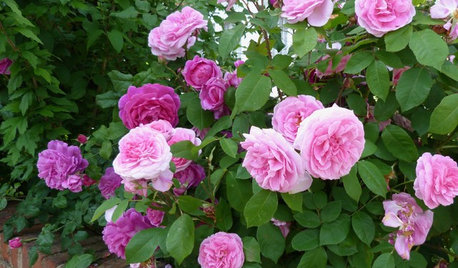
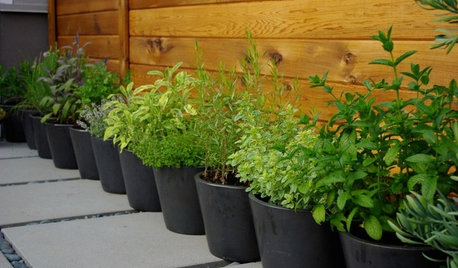
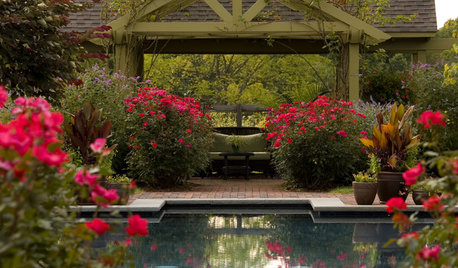
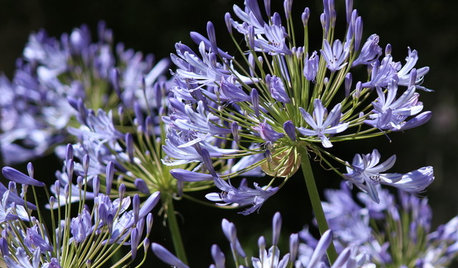
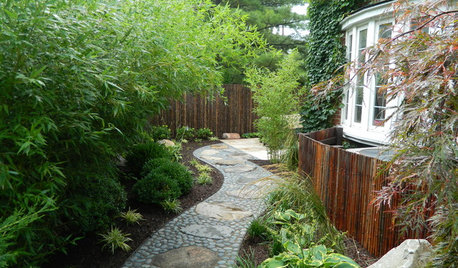
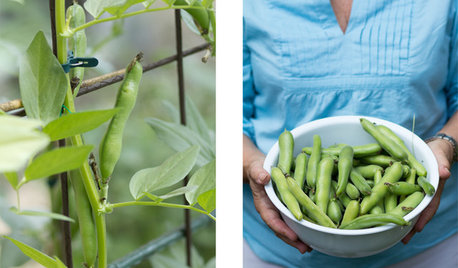

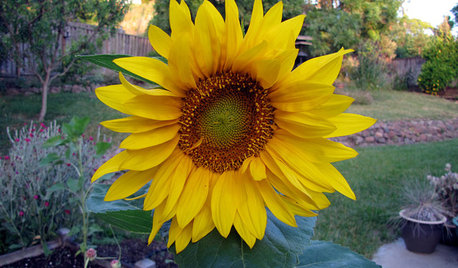
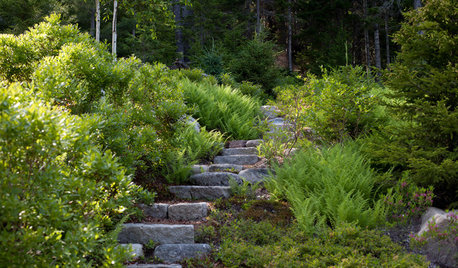
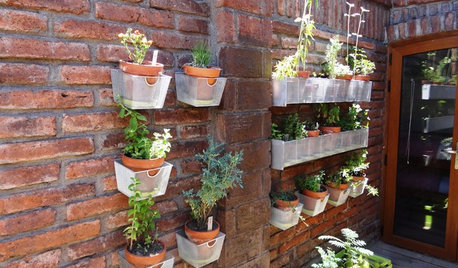










jerijen